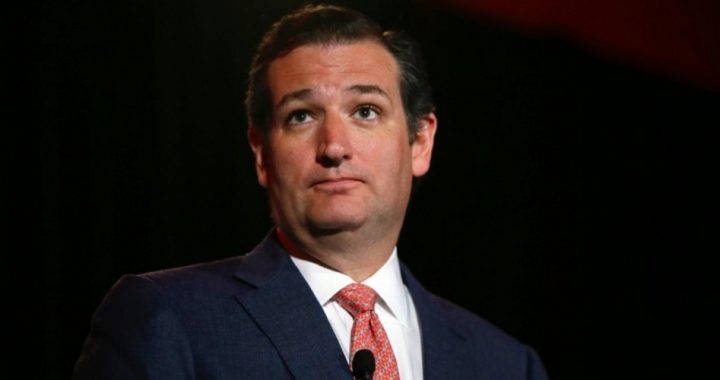
Senator Ted Cruz, who announced his candidacy for the 2016 Republican presidential nomination at Liberty University in Virginia on March 23, has been criticized by Cesar Vargas and Erika Andiola, co-directors of the radical, pro-amnesty Dream Action Coalition.
A statement issued by Vargas and Andiola posted on the Dream Action Coalition website on Monday read:
The only policy Latinos hear from Ted Cruz is that he wants to end DACA for Dreamers, block DAPA for our parents, and obstruct immigration reform for years still. We reject Ted Cruz, which is sad, because while he is the first Latino to declare his candidacy, he may be the most anti-immigration candidate on stage during the debates.
Like most pro-amnesty advocates, Vargas and Andiola have failed to make a distinction between legal and illegal immigration. Cruz and several other contenders for the GOP nomination welcome legal immigrants to this country, but are opposed to granting amnesty to aliens who have broken our laws by entering our country illegally.
Vargas and another protester named Marco Malagon were arrested after they repeatedly interrupted former Texas Gov. Rick Perry and New Jersey Gov. Chris Christie at the Iowa Freedom Summit on January 24.
Vargas told reporters that immigration is a “central issue” for Republicans. “Events like the Freedom Summit further illustrate how out of touch the Republican Party is with the growing Latino and immigrant population in the United States,” said Vargas. “Do they really want to deport me and my mother?”
Cruz also spoke at the summit, as did several other figures regarded at contenders for the GOP presidential nomination in 2016, including former Arkansas Gov. Mike Huckabee and Wisconsin Gov. Scott Walker.
Dream Action Coalition’s name refers to the DREAM Act, an acronym for Development, Relief, and Education for Alien Minors. DREAM was first introduced in the Senate in 2001 and later reintroduced in the 107th through 111th Congresses. It never passed both houses, but President Obama was determined to implement it anyway, and on June 15, 2012, he announced that his administration would stop deporting young illegal immigrants who met certain criteria previously proposed under the DREAM Act.
The amnesty program was called the Deferred Action for Child Arrivals (DACA) program. DACA was formally initiated by a policy memorandum sent from Secretary of Homeland Security Janet Napolitano in 2012 to the heads of U.S. Customs and Border Protection (CBP), U.S. Citizenship and Immigration Services (USCIS), and U.S. Immigration and Customs Enforcement (ICE), ordering them to practice “prosecutorial discretion” toward some individuals who were brought to this country illegally as children and have remained in the country illegally.
The House previously voted to defund DACA last August 31, but that did not prevent the Obama administration from continuing, and even expanding, DACA. Homeland Security Secretary Jeh Johnson sent an executive action memorandum on November 20 to the heads of U.S. Citizenship and Immigration Services, U.S. Immigration and Customs Enforcement, and U.S. Customs and Border Protection that expanded DACA by removing its age cap and extending work authorization to three years. Johnson’s order also expanded “deferred action” (another name for amnesty) by directing USCIS to establish a process, similar to DACA, for granting amnesty from deportation to individuals who met certain criteria. These were mainly those who had a son or daughter who is a U.S. citizen or lawful permanent resident.
Though the original DREAM Act was never passed, pro-amnesty advocates like to use the term “Dreamers” to refer to those who were granted protection from deportation under the DACA plan. The statement released by Vargas and Adiola on March 23 was posted on their website under the headline: “Dreamers Reject a Ted Cruz Presidential Candidacy & His Extremists (sic) Agenda on Immigration.” Fox News described Marco Malagon, the man arrested along with Vargas at the Iowa Freedom Summit, as “a Texas resident who came to the country illegally when he was young and benefited from the Obama administration’s ‘dreamer’ reprieve.”
During Perry’s speech, Malagon shouted: “Governor, do you stand with King, or do you stand with us and our families? Do you think I’m deportable?”
Malagon was referring to Rep. Steve King (R-Iowa), who sent out a tweet during the State of the Union speech in which he referred to a guest of Michelle Obama as “a deportable.”
Another group that criticized Cruz was CASA in Action, whose Virginia director, Lindolfo Carballo, objected to the senator announcing his candidacy in Virginia, asserting that the majority of Virginia voters support comprehensive immigration reform and are unsympathetic to Cruz’s stand on immigration.
“If they don’t turn their policies around, Virginia Republicans are facing political oblivion. Accepting anti-Latino and anti-immigrant candidates like Ted Cruz is not a recipe for survival,” said Lindolfo.
Such rhetoric is difficult to fathom, given that Cruz’s father was an immigrant from Cuba.
While pro-amnesty advocates like to make supporting amnesty for illegal aliens a prerequisite for gaining the support of Hispanic voters, a report last August in Investor’s Business Daily indicated that such voters do not always see the issue in those terms. The report cited the results of a Univision poll among California Latinos indicating that the economy was more important to them than immigration. Twenty-one percent of Latinos polled named education as their top priority, followed by jobs (16 percent), government spending and the deficit (15 percent), Social Security (13 percent), “how will what I do affect my wallet” (10 percent), healthcare (nine percent), and (finally) immigration, named by just eight percent.
The article refuted the concept that California Latinos are disenchanted with the Republican Party, and cited poll results that while 17 percent disliked the GOP for being too close to giant corporations, only 10 percent had an unfavorable view of the party’s stand on immigration.
Investor’s Business Daily summed up the findings: “The data don’t back the idea that the GOP doesn’t stand a chance with this [Hispanic] demographically rising group without open borders and amnesty.”
Photo of Sen. Ted Cruz: AP Images
Related articles:
Would Ted Cruz Make a Good President?
Obama Immigration Amnesty Action Is on Hold as Appeals Are Planned
Federal Judge Stops Obama Executive Action Amnesty
More States Suing Feds Over Immigration Executive Orders
States Sue Obama Administration Over Executive Order on Immigration



